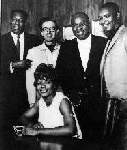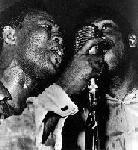Stax Special
|
In The Beginning | ||
One of the most important companies in R&B history, Stax represented one of the two main strands in American black music (Motown was the other). Ironically but not untypically, the label was founded by a white guy, Jim Stewart, whose musical background was actually in country music.
He formed his own label (Satellite) in 1957 and produced his own record and a couple of other releases, including quite a good rockabilly (Don Wallis' 'Boppin' High School Baby'). Stewart's sister, Estelle Axton, then took the brave step of mortgaging her home to help finance the purchase of an Amplex mono recorder and, after a one year stint in Brunswick, they set up operations in an old Memphis neighbourhood theatre at 926 East McLemore - they rented the premises for $100 a month, pulled it apart and set up a control room on what used to be the stage area. They also divided the theatre in two, since the original building was too big to house the Amplex recorder, the front part of the building becoming the famous front of studio record shop. Stewart and Axton were on their way |
|
For Your Pleasure |
Artist Roster | |
If you really want the killer collection, then "The Complete Stax-Volt Singles 1959-68" Box Set is the one to get.  Containing every single released throughout Stax's 'first' period, there are nine CDs and a superb 64 page booklet with a wealth of information. There are a host of lesser known treasures here which all but the most ardent Stax fan will be hearing for the first time. It's excellent, but it's very expensive, especially in the UK. For completists everywhere!! Containing every single released throughout Stax's 'first' period, there are nine CDs and a superb 64 page booklet with a wealth of information. There are a host of lesser known treasures here which all but the most ardent Stax fan will be hearing for the first time. It's excellent, but it's very expensive, especially in the UK. For completists everywhere!!
If you want a more manageable and affordable introduction to this period of Stax history, try picking up the 'Thousand Volts' re-release packages from Ace Records - a good example is "4000 Volts Of Stax And Satellite" on Stax which showcases some of the less well known material. There are also Box Sets Volumes 2 and 3 available which cover the period between 68 and 75. Volume 2 is a 9CD effort, released through Ace as 9SCD 4411 (and now available on Stax itself). You can also pick up the individual volumes (at the time of writing on the Rhino label). For the later period I have chosen a one CD collection called Stax Gold (STA CDSXD 043) rather than the Box Set.. All the good Finally, don't forget you can read a little bit more about certain Stax artists, such as Otis Redding, Sam and Dave, The Staple Singers, Albert King and Little Milton in the Artist Biographies section of the Primer. |
|
|
Keys To Greatness | ||
|
Rufus and Carla Thomas became the first artists to record in the Memphis studio. 'Cause I Love You' was released in the summer of 1960 as Satellite 102. The track featured Booker T. Jones (only 16 and playing sax rather than his trademark organ of later years). Atlantic records got a master lease agreement on all Rufus and Carla Thomas releases, in exchange for a $5,000 advance. A handshake deal also secured first refusal on the distribution of any Stax release. A deal which Stax needed at the time because it gave them real distribution muscle, it was formalised in 1965. It did them no favours in the long term and led to real acrimony when Atlantic sold out to Warner Brothers 'Gee Whiz' by Carla Thomas broke Stax nationwide when it became their first pop hit, reaching #10 on the pop charts. Written by Carla when still a teenager, the record had backing vocals from the Veltones and a string arrangement from Stewart himself The 'Sound Of Stax' emerges in 1961 with the release of the Mar-Kays 'Last Night'. The unique house band hybrid, racially integrated players, all working together to create the Stax house style (the prominent horns, large drum sound and high profile organ) typified soul in the 1960s. All these players mutated into the two main components of the core Stax sound - Booker T. and the MGs and the Memphis Horns The relationship with Atlantic brings Otis Redding to Stax when the label records a session with Johnny Jenkins and the Pinetoppers. 'These Arms Of Mine' is the first Otis release on Stax and April, 1965 sees Otis' biggest commercial success prior to the posthumously released 'Dock Of The Bay' - 'I've Been Loving You Too Long' reaches #21 on the pop charts . Sam And Dave were signed by Atlantic in 1965 but were loaned to Stax as fully fledged Stax recording artists. Although their first release was written by David Porter alone, they became the recipients of songs from one of the great songwriting partnerships in soul music - Isaac Hayes and David Porter 1965 was simply a great year. Sam and Dave began their enormous run of success, Otis produced the classic 'Respect and, significantly, Al Bell joined the company as head of promotions. Opinion is divided however on whether the recruitment signalled the end of what was truly special about Stax, replacing it with a more ruthless approach to the business of making records Stax start to take the Blues seriously when Albert King is signed to the label in 1966. Estelle Axton takes credit for convincing the rest of the company that the Blues would sell. 'Laundromat Blues' was the first of many successful releases for King on the Stax label, releases which also included 'Born Under A Bad Sign', a blues standard subsequently recorded by many over the years 'When Something Is Wrong With My Baby' by Sam and Dave was released in 1967. Just another Stax release at the time, it is undoubtedly the duo's finest moment and is also noteworthy as the only ballad they ever produced while they were recording for the Stax label Otis played the Monterey pop festival, which proved to be a massive breakthrough for Redding himself and for Stax and black music in general. It was probably the single most important influencing factor in Redding's new found ability to crossover to white America Atlantic was sold in 1968 and, under the terms of the original contract, Stax chose to exercise the option to declare the contract null and void and go their own way - the success continued, commercial success even increased, but the seeds of the demise were also starting to appear From mid 1968, after the break with Atlantic, through to the label's finish in 1975, Stax had even greater commercial success than that achieved by what became known as Stax Mark 1. For the seriously sad amongst us, this later period is known to all collectors as the 'yellow period', purely because the label colour had changed from the blue of the earlier years In 1969, Isaac Hayes went solo and released the extremely influential "Hot Buttered Soul" album, with extended raps on well known tracks such as 'By The Time I Get To Phoenix', which Hayes turned into an eighteen minute opus. In 1971 Hayes paved the way for a certain kind of movie score with the release of the Shaft soundtrack, the title track of which became a hit single. Although the movies themselves were often seen as exploitative and stereotypical, artists such as Curtis Mayfield, with the wonderful "Superfly" score, capitalised on Hayes pioneering work Stax gained further success in the pop charts in 1972 and beyond with a return to the label's roots. The Staple Singers up-tempo gospel sermonising gave Stax two of their rare #1 pop hits, hitting the charts with 'Respect Yourself' in 1972 and 'I'll Take You There' the following year Business machinations began to take over from the music from around the beginning of 1973 onwards. Although the label continued to have hits (from artists such as Shirley Brown, Johnnie Taylor, The Soul Children, Mel and Tim and The Emotions) a golden success story was drawing to a close |
||
|
The Demise | |||||
The sale of Atlantic Records to Warner Brothers as far back as November, 1967 probably set the scene for Stax's eventual downfall.
Under the new regime, bitterness and acrimony appeared to be rife (rumours that Al Bell was operating divide and rule tactics and freezing out stalwarts such as Booker T. and Steve Cropper didn't help). In 1970, Stewart and bell bought the company back from Gulf and Western and became 50-50 partners. But Stewart was tiring of the constant business negotiations and was saddened by his increasing distance from the music itself - he wanted out. In 1972 Bell started to negotiate with Columbia, set up a distribution deal and bought Stewart out. The Stax 'family' was now scattered all over the States,
In 1973 CBS took another look at the Stax contract and started to cut back on the advances. It started to go downhill pretty fast from this point on, although since it's not a period that most of the key players much want to talk about, it's hard to get that clear a picture. The IRS started to investigate the company, a bank audit was carried out and numerous rumours were doing the rounds that 'kickbacks' had been common place in much of Stax's business dealings. Even then, Stewart showed his commitment, however misguided, to the company he founded by pushing his personal fortune at the problem to try and rescue it, but it was too late. Bell and Joseph Hartwell from the Union Planters Bank were indicted for conspiracy to defraud - Bell was acquitted (and Stewart always argued Bell's innocence) but Hartwell was convicted, although it was unclear with whom he conspired since Bell was found innocent and no others were ever indicted. |

 stuff from the period is on here, including all the big commercial successes from Johnnie Taylor, The Staple Singers, The Soul Children, Shirley Brown, The Dramatics and Mel and Tim.
stuff from the period is on here, including all the big commercial successes from Johnnie Taylor, The Staple Singers, The Soul Children, Shirley Brown, The Dramatics and Mel and Tim. 
Leave a comment